Key takeaways:
- Understanding publication ethics emphasizes integrity, transparency, and proper crediting in academic work.
- Ethical standards foster a collaborative culture and trust among researchers, critical for genuine scholarly communication.
- Common challenges include authorship disputes, pressure to publish, and data integrity issues that require clear communication and adherence to ethical practices.
- Effective strategies for addressing ethical dilemmas include establishing collaboration frameworks, fostering open dialogue, and seeking mentor guidance for diverse perspectives.
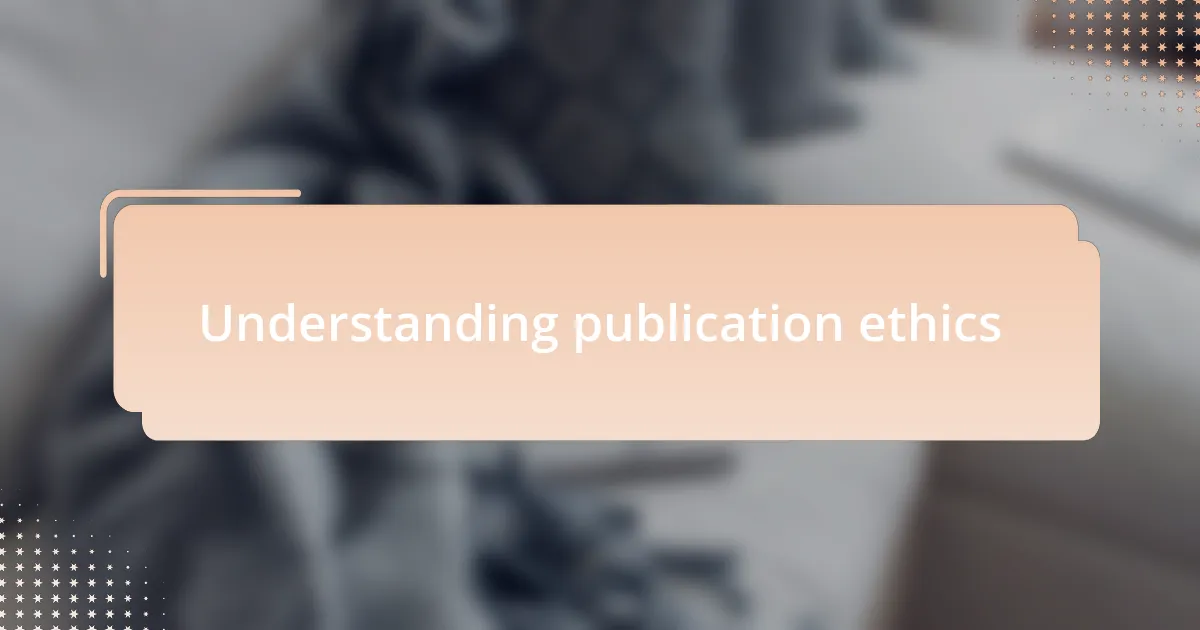
Understanding publication ethics
Understanding publication ethics is crucial for anyone involved in academic publishing. I remember my first encounter with this topic when I inadvertently included a citation that wasn’t comprehensive enough. It felt like I’d breached a trust, both with my readers and the original authors. This experience highlighted for me the importance of integrity and transparency in our work.
One key aspect of publication ethics is ensuring that we give proper credit where it’s due. I once faced a moral dilemma when a colleague suggested a collaborative project that blurred the lines of authorship. It made me reflect: how do we truly define contribution? It’s not only about who did what, but also about recognizing the invisible labor that goes into research. This situation made me realize that ethical publishing isn’t just a checkbox; it’s about nurturing a culture of respect within the academic community.
Moreover, navigating the complexities of ethical considerations often requires an awareness of potential conflicts of interest. At one point, I was invited to review a paper from a journal where I was also considering submitting my own work. The unease I felt made me question my objectivity. Would my involvement cloud my judgment? This moment taught me that being transparent about our affiliations and interests not only protects us, but also upholds the integrity of the entire publication process.
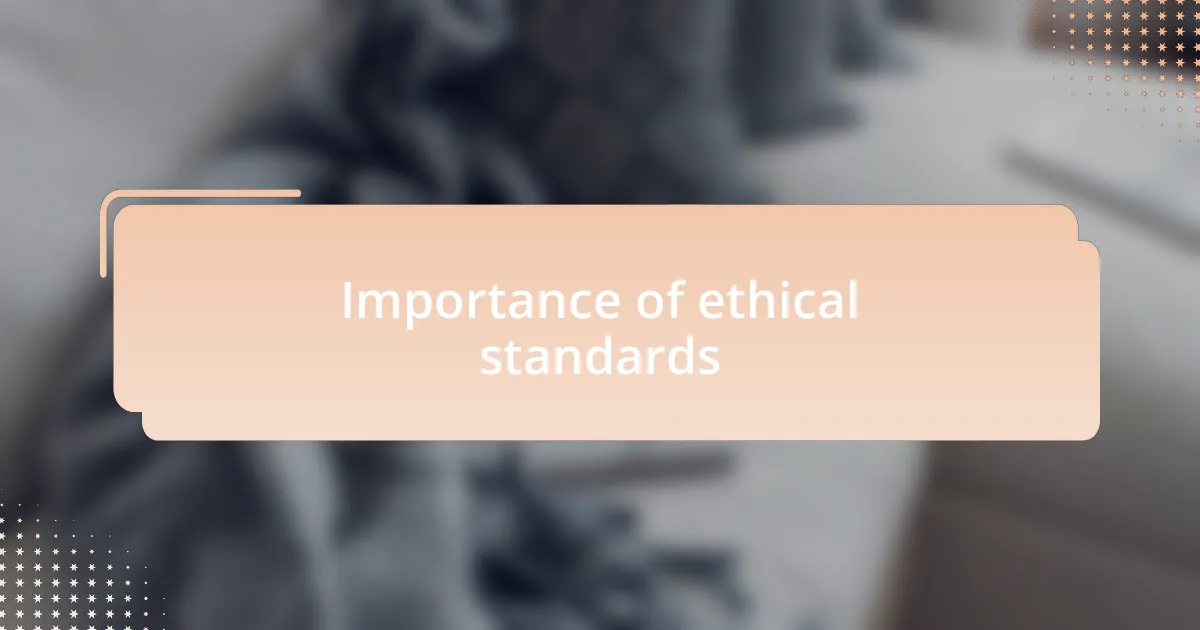
Importance of ethical standards
Ethical standards are the bedrock of trust in academic publishing. I recall a time when I had to address an issue of plagiarism in a paper I was reviewing. The unsettling feeling of having to confront a colleague about their oversight was challenging. It made me realize that without ethical standards, our work could easily devolve into a landscape of doubt and suspicion, undermining the very essence of scholarly communication.
In my journey, I’ve also witnessed how upholding ethical standards fosters a collaborative environment among researchers. During a conference, I overheard two scholars passionately debating a controversial study. Rather than dismissing each other’s viewpoints, they engaged in a respectful dialogue about their differing interpretations. This experience reinforced my belief that when ethical norms are prioritized, it not only elevates the discourse but also drives innovation through diverse perspectives.
Maintaining ethical standards isn’t just about adherence to rules; it’s about creating a culture of accountability. A few years ago, I had a mentor who emphasized the importance of peer review integrity. Reflecting on this guidance constantly reminds me: how can we expect progress in research if we’re willing to overlook unethical practices? As I navigate my own path in academic publishing, I hold on to this principle, knowing it shapes not just my career, but the entire academic landscape.
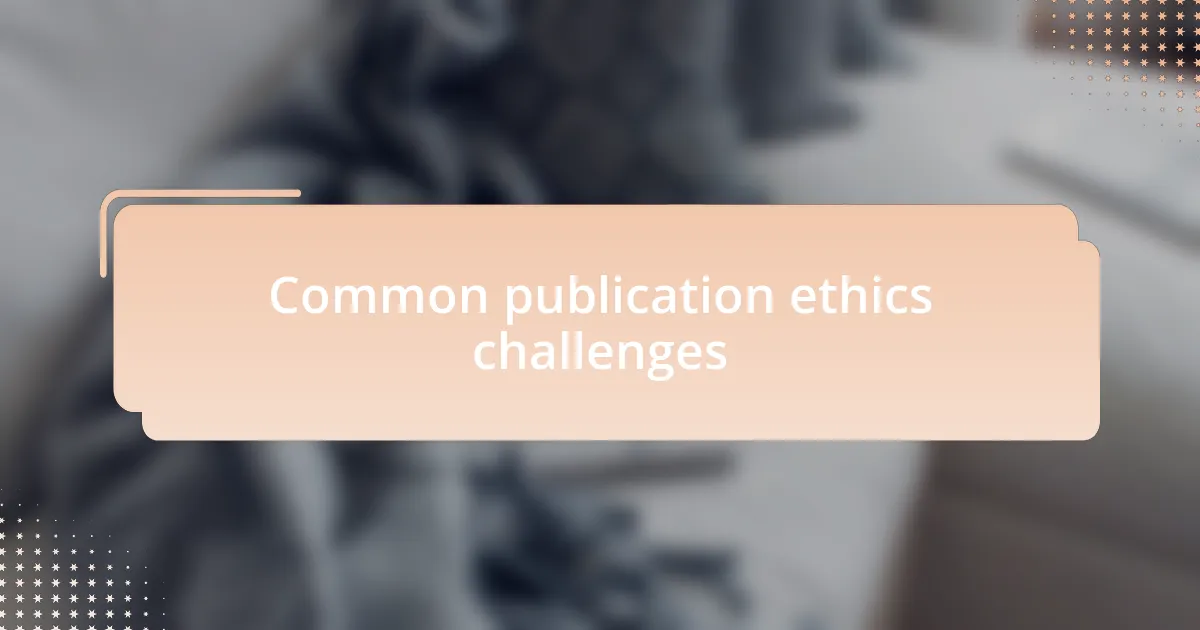
Common publication ethics challenges
In the realm of academic publishing, one notable challenge I’ve encountered is authorship disputes. I remember collaborating on a project where contributions were uneven, yet attribution became a point of contention. This situation raised questions for me: How do we fairly represent the efforts of all contributors while maintaining transparency? It highlights the need for clear communication and agreement on authorship criteria from the start.
Another common issue is the pressure to publish, often leading researchers to consider dubious shortcuts. I once found myself tempted to rush a paper because I felt the weight of expectations from my peers and institution. Reflecting on that moment, I realized that while the drive to publish is strong, compromising ethical principles jeopardizes our credibility and the trust placed in our research by the community. This predicament often pushes me to advocate for a balanced approach in discussions with fellow academics.
Then there’s the persistent challenge of data fabrication and manipulation, which I find particularly disheartening. During a project review, I was taken aback when I discovered discrepancies in the data presented by a colleague. It made me question the integrity of the research process: What good is our work if we don’t uphold the truth? Ensuring the authenticity of our data isn’t just a moral obligation; it’s foundational to the advancement of science itself.
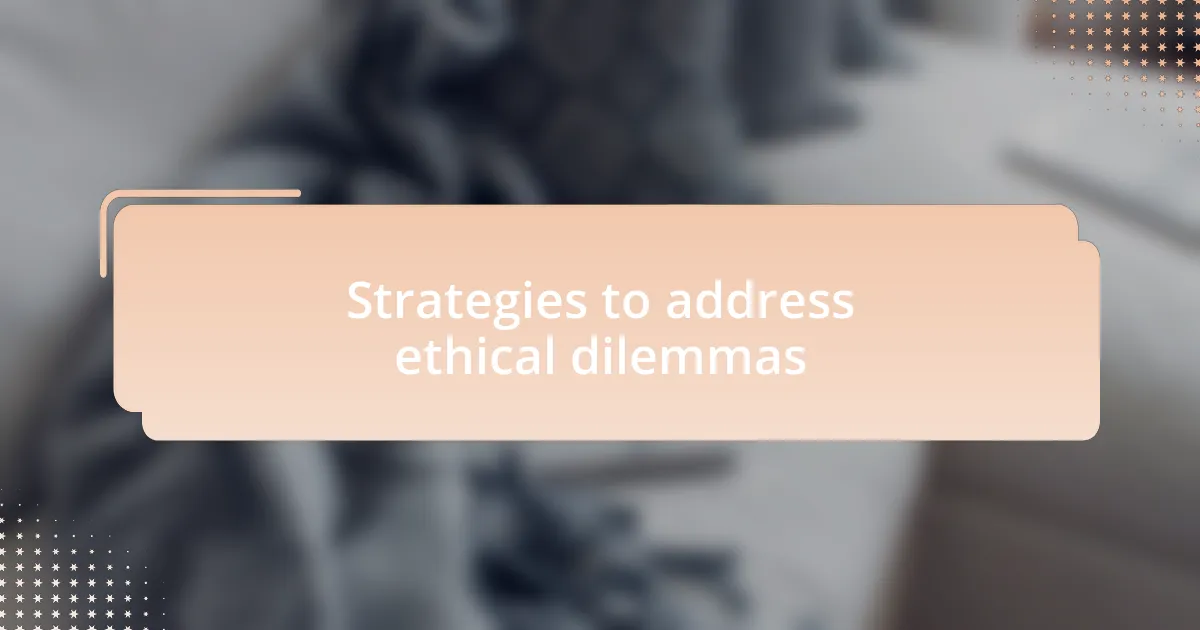
Strategies to address ethical dilemmas
When facing ethical dilemmas in academic publishing, one strategy I’ve found effective is to establish a robust framework for collaboration right from the beginning. In a previous project, my team and I utilized a shared document to outline each member’s responsibilities and contributions. This proactive approach minimized misunderstandings regarding authorship and kept everyone on the same page.
Another strategy revolves around fostering a culture of open dialogue. I remember a tense moment during a peer review process when a colleague raised concerns about data interpretation. Instead of dismissing their perspective, we engaged in a candid discussion. This not only strengthened our findings but also emphasized the importance of constructive critique within our research community. How could we improve our work without genuinely listening to one another?
Moreover, institutional support can play a crucial role in mitigating ethical challenges. During my tenure at a university, I participated in workshops on publication ethics, which provided valuable insights into navigating tricky situations. Feeling prepared to address potential dilemmas was empowering. It reinforced my belief that investing in ethical training fosters a community where integrity is prioritized.
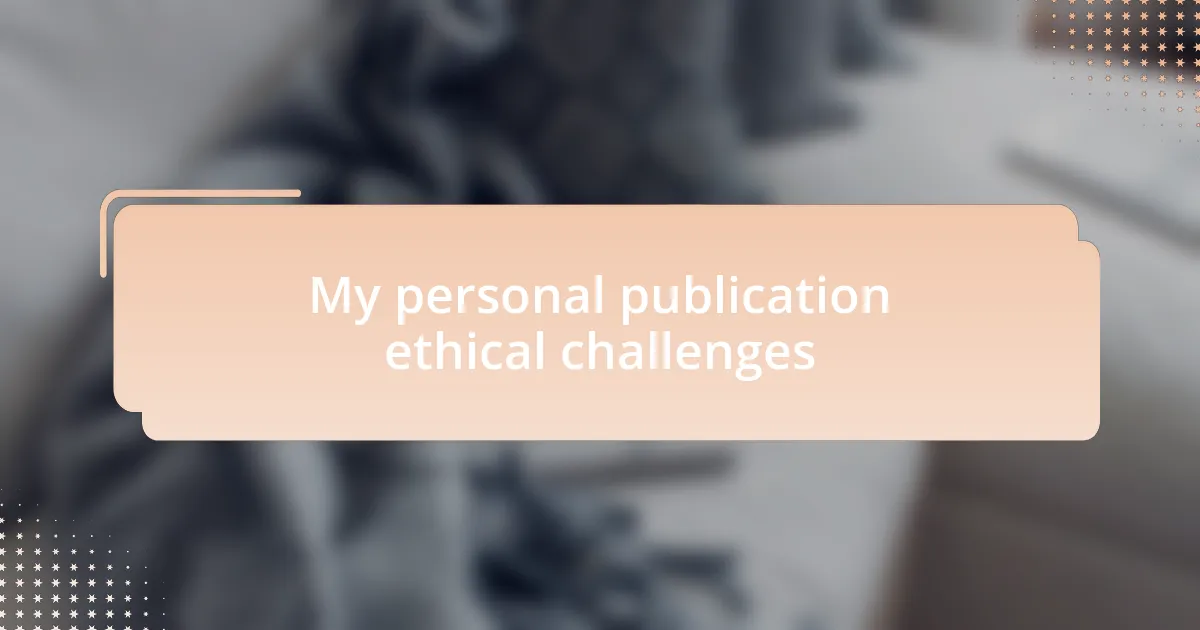
My personal publication ethical challenges
Navigating ethical challenges in publication has often felt like walking a tightrope. I vividly recall a particular instance when I found myself in hot water over a data citation issue; I had used datasets from a colleague, but I inadvertently failed to name them properly in the acknowledgment section. This oversight left me feeling anxious. How could I have been so careless? It highlighted the necessity of due diligence in giving credit where it’s due.
Another ethical challenge I faced was related to the pressure of publishing frequently in order to bolster my academic profile. I encountered this while working on a collaborative paper that ultimately required us to rush some findings just to meet an arbitrary deadline. I felt a nagging discomfort—was the quality of our research gonna suffer? That experience taught me the value of balance between personal ambition and scholarly integrity.
Lastly, dealing with conflicts of interest has been a reality I had to grapple with. During a conference presentation, I discovered that I was inadvertently sharing the stage with someone who had direct ties to a commercial entity tied to my research topic. The unease it caused me was palpable. Would the audience see my work as impartial? This incident reinforced my commitment to transparency in my work—an invaluable lesson in the intricate dance of academia.

Lessons learned from my experiences
Lessons learned from my experiences
One significant lesson I absorbed is the critical importance of meticulousness in citing sources. I remember revisiting an old manuscript of mine and noticing that I had cited a pivotal study incorrectly. It struck me how this simple error could ripple out and mislead readers. This realization made me appreciate the role of precision in academic writing—all it takes is one overlooked detail to undermine the integrity of my work.
Moreover, the importance of open communication with collaborators became abundantly clear during a challenging project. At one point, I hesitated to voice my concerns about the direction we were taking, fearing it might disrupt team morale. Eventually, I spoke up, and the resulting dialogue not only improved our research but also strengthened our collaborative relationship. This experience taught me that fostering an environment where everyone feels comfortable sharing their thoughts is essential for producing quality work.
Lastly, I learned that confronting ethical dilemmas often requires personal reflection. After a controversy arose about a paper I co-authored, I found myself questioning not just the decisions made but my own values and the motives behind them. Engaging in this self-reflection allowed me to realign with my ethical compass. It’s crucial to remember that academia isn’t just about results; it’s about maintaining integrity throughout the entire process.
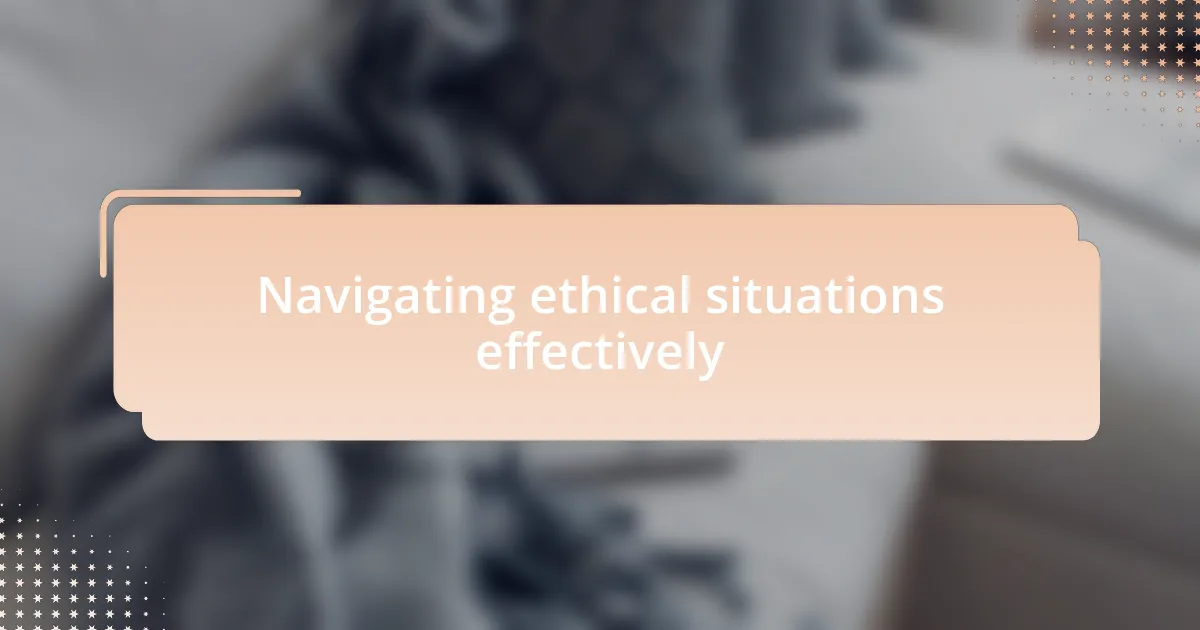
Navigating ethical situations effectively
When faced with ethical dilemmas, I often find that my first instinct is to pause and assess the situation critically. One such moment arose during a peer review process when I stumbled upon potential biases in the research methods. It prompted me to question, “What if I don’t speak up?” This internal debate reminded me that remaining silent could compromise not only my integrity but also the integrity of the field. I made the choice to communicate my concerns, which ultimately led to a more rigorous and transparent review.
I also recall a time when navigating conflicts of interest was particularly tricky. While collaborating with a colleague on a grant application, I discovered a financial link that hadn’t been disclosed. The immediate gut reaction was to step back, but I knew I had to act with integrity. I initiated a candid discussion about the potential implications, and we agreed to address the situation head-on. This taught me the importance of transparency and accountability, reinforcing that ethical behavior should be woven into the fabric of our collaborative efforts.
Lastly, I believe that effectively navigating ethical situations often involves seeking guidance and diverse perspectives. During one challenging moment, I reached out to a mentor whose insights helped clarify my own values. Engaging with someone who had faced similar issues provided me with different angles to consider. I gained a renewed sense of confidence in my ability to handle ethically charged situations, showing me that collaboration isn’t just about shared research but also about shared ethical commitments.